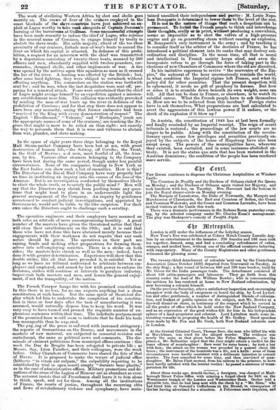The French Usurper hangs fire with his promised constitution. In
this there is no loss, for no one expects anything but a sham constitution at such hands. But the same spirit of theatrical dis- play which led him to undertake the completion of his constitu- tion in three or four days after the task of manufacturing it was assumed, would naturally dispose him to keep his word. It was wry easy to have turned and pruned the requisite number of eu- phonious sentences within that time. The indefinite postponement of the promised boon would seem to indicate that he finds his tools less manageable than he expected. The gaging of the press is enforced with increased stringency; the reports of transactions on the Bourse, and movements in the markets of raw material, are subjected to censorial revision and curtailment, the same as political news and comments. The dis- missals of eminent politicians from municipal offices continue : this week the Due de Broglie has been relegated to private life ; as Messrs. Say, Leon Faucher, and their colleagues, were the week before. Other Chambers of Commerce have shared the fate of that of Havre. It is proposed to make the tenure of judicial office (hitherto " in vitam ant oulparn," the culpability requiring to be established by trial in open court) simply " durante bone plaoito," as in the case of administrative offices. Military promotions and do- nations of the cross of the Legion of Honour are as abundant as ever. The autocrat insists that all Frenchmen shall leave it to him alone to think, speak, and act for them. Among all the institutions of France, the courts of justice, throughout the recurring ebbs And flows of revolutionary violence and sycophancy, have main- tained unsullied their independence and purity : M. Louis Napa lean Bonaparte is determined to lower them to the level of the rest. It is not it the nature of things that such a despotism can be permanent. To forbid the French people to think and interchange their thouGhte, orally or in print, without producing a convulsion, seems as impossible as to shut the valves of a high-pressure engine and go on generating steam without causing an explosion. M. Bonaparte's only instrument is the army ; and by teaching it to consider itself as the arbiter of the destinies of France, he has introduced a political element into its ranks that may destroy sub- ordination and discipline. In the mean time, all that is moral and intellectual in French society keeps deaf, and even the bourgeoisie refuse to go through the farce of taking part in the elections of new Chambers of Commerce where the old are dissolved.
In his imitative eagerness to revive " the souvenirs of the Em- pire," the autocrat of the hour unconsciously reminds the world, in what condition the Imperial regime left France, and what its policy did for other countries. That the present despotism will be ephemeral, it needs no gift of prophecy to foresee. But how or when it is to crumble down beneath its own weight, none can tell. All that can be done in France, or elsewhere, is to watch its suicidal career. What the French people have to ask themselves is, How are we to be relieved from this incubus? Foreign states have to ask themselves, What preparations are best calculated to avert the aggressions of this lawless power if it endure, or the shock of its explosion if it blow up ?


























 Previous page
Previous page